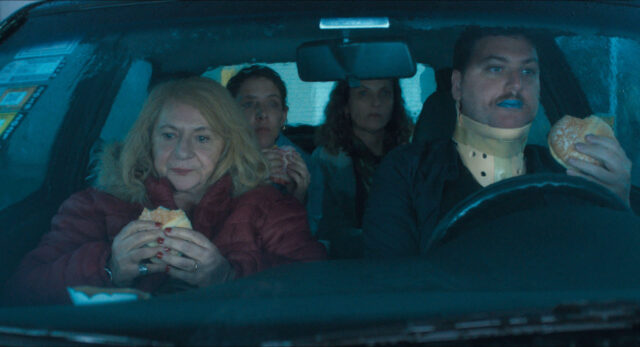
A Jewish family in Buenos Aires faces death and desperation in Most People Die on Sundays
MOST PEOPLE DIE ON SUNDAYS (LOS DOMINGOS MUEREN MÁS PERSONAS) (Iair Said, 2024)
Quad Cinema
34 West 13th St. between Fifth & Sixth Aves.
Opens Friday, May 2
quadcinema.com
In his 2019 debut feature-length documentary, Flora’s Life Is No Picnic, Buenos Aires–born filmmaker Iair Said looked at his concern about his great-aunt Flora’s apartment; he was hoping that she would leave it to him in her will, but instead she planned to donate it to the Weizmann Institute of Science.
In his 2024 debut feature-length narrative film, Most People Die on Sundays, writer-director Said stars as David, a thirtysomething man-child who who can’t find his place in a world he doesn’t know how to navigate. Inspired by the death of Said’s father, the story follows David as he returns home to Buenos Aires for the funeral of his uncle. David has been in Italy for a year studying, of all things, communication; he could not be more awkward speaking with others, be it his beloved mother, Dora (Rita Cortese), his sister, Silvia (Juliana Gattas), his cousin, Elisa (Antonia Zegers), or anybody else, from his driving instructor to his mother’s next-door neighbor to a flight attendant — to his own father, who lies in a coma at a clinic.
Queer, Jewish, and schlubby, David moves slowly, talks slowly, and thinks slowly, his face almost always in a deadpan stare, resembling Jimmy Kimmel mixed with Fatty Arbuckle. David keeps finding ways to avoid visiting his father even as the family discusses euthanasia — as well as ways to afford his uncle’s funeral and burial.
David is far from oblivious to what is happening; he just seems unable to take reasonable action, wandering through life in a kind of haze, relying on others to take care of him.
“I think I am a little sad,” he narrates as he goes through a battery of health tests. “To be back home, to have to live with my mom. . . . The house is somehow in bad shape. I feel bad for her. She is so alone. My dad’s condition is not going to change. He is practically dead. Him dying means all of us are going to die too, that everything has an ending. I can’t imagine living my life without him. If Dad remains like that for many years, my mom will not get to know anyone else, she won’t stop looking after him . . . That is a lot for her. I chose to be alone. She hasn’t.”
David might say that he chooses to be alone, but as Said shows particularly in the first and last scenes, that is actually the last thing David wants.
Most People Die on Sundays moves at the pace of David’s mind, slowly yet earnestly, with a subtle, carnivalesque score by Ascari that mimics David’s stunted emotional understanding and often pathetic, sad-sack choices. He is terrified of death, be it that of others or his own, and it haunts his thoughts. He is so desperate to be loved that he comes close to stalking several men he is attracted to. Just about the only time the family has any fun is during a Passover seder, where the wine is spoiled and David complains that the fish smells, well, like fish.
Earlier, Dora gives a doctor at the clinic some matzah, telling him, “It’s an unleavened, unsalted flatbread, but it’s tasty. If you want to be a Jew, you must know how to suffer.” The doctor asks her what happened and she answers with a dejected, downtrodden look, “My son’s back.”
David and Most People Die on Sundays are like a whole box of matzah.
[Mark Rifkin is a Brooklyn-born, Manhattan-based writer and editor; you can follow him on Substack here.]